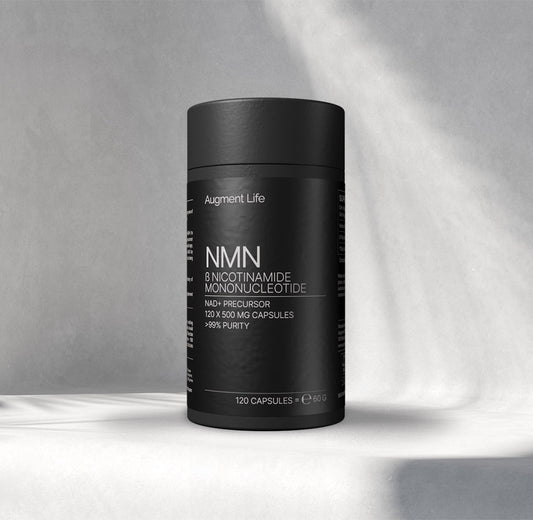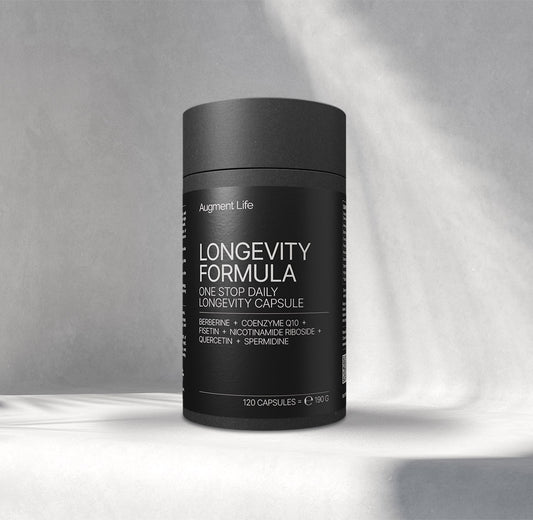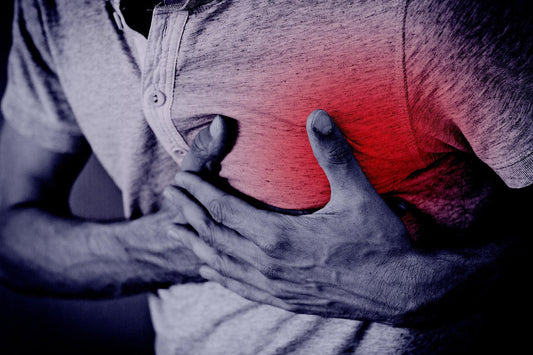Feeling overwhelmed by the fast pace of life? You're not alone.
In today’s world, stress is an everyday challenge. While a little pressure can help us perform, chronic stress can seriously affect our health, both mentally and physically.
But here’s the good news: you can naturally reduce stress with simple, effective techniques. If you’re looking for extra support, certain supplements might also help.
Keep reading to learn how stress affects your body and mind, and discover practical stress management tips you can start using today to feel calmer, healthier, and more in control.
What is stress and how does it affect you?
Stress is your body's natural response to a challenging or demanding situation. We rely on this “fight or flight” response to get us through tough times.
When you sense a threat or danger, your body rises to the challenge by:
- releasing stress hormones,
- tightening your muscles,
- raising your blood pressure,
- making your heart and lungs work harder.
It also releases a surge of fat and sugar into your bloodstream to give you extra energy. Once the danger passes, your body returns to its normal state.
Sometimes stress can be a positive force, motivating you to perform well. Our bodies can usually handle acute or short-term stress without long-term effects.
But long-term or chronic stress can make you sick, both mentally and physically. Long-term or chronic stress occurs when your body stays in stress mode for months or even years. It can be due to one long-term stressor, like caring for someone who is chronically ill, or from numerous short-term stressors with insufficient time for a return to a resting state.
The effects of stress on your body and mind
The body goes through two phases in reaction to acute stress: the “fight or flight” response and the recovery phase.
Prolonged periods of stress result in adaptation, which is marked by the continuous release of stress hormones and symptoms such as irritation and an inability to concentrate (1).
If stress persists, the body enters the exhaustion stage, which is characterized by lower stress tolerance, exhaustion, sadness, anxiety, and burnout (1).
Acute stress can precipitate cardiovascular events such as:
- arrhythmias,
- angina,
- stress cardiomyopathy,
- myocardial infarction,
- stroke,
- sudden death (2).
The effects of chronic stress
Chronic stress can cause dysfunctional responses that lead to various health problems such as heart disease, stomach ulcers, sleep dysregulation, and psychiatric disorders. Consequences of chronic stress also include cardiovascular disease and immune system dysregulation (1).
Cardiovascular responses to stress include elevated heart rate and blood pressure, which significantly contribute to the cardiovascular disease incidence. Stress-related psychological disorders are associated with increased risk for coronary artery disease, hypertension, and stroke (1).
Chronic stress can lead to changes in the immune system that may increase the risk of chronic infections, inflammatory autoimmune diseases, or even cancer (1).
A review conducted in 2022, integrating animal, human, and in vitro studies, indicated that chronic stress is associated with accelerated biological aging. Exposure to chronic stressors and stress hormones affects key hallmarks of aging, including:
- DNA damage,
- telomere shortening,
- cellular stress,
- inflammation,
- mitochondrial dysfunction,
- cellular senescence (3).
Stress is also associated with increased symptoms of:
- depression,
- heightened anxiety,
- elevated levels of irritability,
- impairments in cognitive function.
Psychological resilience as a shield against stress-induced biological aging
A 2023 study found that psychological resilience factors, specifically emotion regulation and self-control, influence stress-associated biological age acceleration (4).
Poor emotion regulation was associated with greater stress-related age acceleration, whereas stronger emotion regulation prevented significant effects of stress on accelerated aging. Additionally, self-control moderated the relationship between stress and insulin resistance, with higher self-control reducing the impact of stress on insulin resistance (4).
The study demonstrates that cumulative stress is associated with epigenetic aging in a healthy population, and that biobehavioral resilience factors can modify these associations (4).
Instead of allowing stress to overwhelm your emotions and lead to anxiety and other negative feelings, you can enhance your emotional regulation and self-control by:
- being mindful of your emotions,
- journaling,
- using cognitive-behavioral techniques to identify triggers that contribute to stress.
This may help reduce the length of time you experience stress and its impacts on your well-being.
Daily habits for managing stress
The best way to cope with stress on a daily basis is to practice healthy habits, such as getting at least seven hours of sleep per day, eating a predominantly plant-based diet, exercising regularly, meditating, and staying socially connected.
Getting more exercise, practicing mindfulness, spending time with a pet, minimizing screen time, and getting outside more often are all additional ways you can reduce stress. These healthy habits help you become more resilient and better able to adapt to life’s challenging situations.
Staying offline can also help, especially if work emails or social media bring you a lot of stress. You can read more about the benefits of limiting screen time in our previous article:
Effective ways to begin reducing stress in your life
Reducing stress levels can not only make you feel better right now, but may also protect your health long-term. Try boosting your positive feelings like happiness, joy, contentment, and enthusiasm by making time for enjoyable activities every day.
Other helpful ways to reduce stress include:
- Identify what’s causing stress - Monitor your state of mind throughout the day. If you feel stressed, write down the cause, your thoughts, and your mood. Once you know what’s bothering you, develop a plan for addressing it. That might mean setting more reasonable expectations for yourself and others or asking for help.
- Build strong relationships -Reach out to family members or close friends and let them know you’re having a tough time. They may be able to offer practical assistance and support, useful ideas, or just a fresh perspective as you begin to tackle whatever’s causing your stress.
- Walk away when you’re angry - Before you react, take time to regroup by counting to 10. Then reconsider. Walking or other physical activities can also help you work off steam. Plus, exercise increases the production of endorphins, your body’s natural mood booster.
- Rest your mind through sleep - To get the recommended seven or eight hours of sleep, cut back on caffeine (especially after noon), remove distractions such as TVs or computers from your bedroom, and go to bed at the same time each night.
How to relieve stress quickly
A useful approach to coping with stress is learning how to quell your body’s stress response when it gets triggered. Try any of these tips to relieve stress in the moment.
1. Stress-relieving exercises
Do a relaxation exercise that slows your breathing, reduces your heart rate, and lowers your stress hormones. Try a basic breathing exercise, such as taking 10 very slow breaths in and out.
Or try a simple imagery exercise: Imagine yourself in your favorite vacation spot—maybe at the beach or somewhere in nature. Imagine all the sensations you'd experience there, like the sound of waves, the smell of the ocean, and the feeling of a gentle breeze on your skin. Stay with that image for a few minutes and notice how your body starts to relax.
You can read about the NSDR that guides the body and mind into deep relaxation in one of our previous articles:
2. Take a mindfulness break
Mindfulness helps you relax by bringing your attention to the present moment. It can break a cycle of stressful thoughts and calm your mind. It's like a real-time imagery exercise: you note all of your senses as you do something soothing.
Try focusing on your senses while holding a warm cup of tea, noticing its smell and how it feels as you drink it. You can also take a mindful shower or go for a slow, peaceful walk in nature, paying attention to what you see, hear, and feel.
3. Stretch your muscles
Your muscles tense up under stress. To release that tension, try this stretch: While sitting or standing, breathe in and raise your arms over your head. Lace your fingers together and stretch upward. Then let go of your fingers and exhale as you lower your arms to each side. Repeat this three times.
4. Take a brisk walk
Even a quick 10-minute walk when you're feeling triggered can help "burn off" stress hormones, counter muscle tension, and release the body's feel-good chemicals, which promote relaxation.
5. Reduce loud noise in your environment
Loud noise triggers the stress response, makes it hard to think, and takes you away from being mindful. If loud noise is unavoidable (perhaps because it comes from neighbors, traffic, or someone in your home or office), try wearing earplugs or noise-canceling headphones.
6. Play soothing music
Pleasing music can help elicit the relaxation response. Music can provide a mental distraction, lessen muscle tension, and lower stress hormones. It’s important to be present and engaged in the sounds you're hearing.
7. Counter negative thoughts
Positive thoughts help boost positive emotions. Find three positive things for one negative or stressful thought. Count your blessings, such as a safe place to live, a delicious meal, and heat for your home during cold weather.
8. Use positive self-talk
When you're self-critical, it triggers your stress response. Instead, try giving yourself praise and encouragement, as it helps reduce stress. Remind yourself with phrases like: “You can do this. You're smart and strong, and you’ve overcome bigger challenges before. Even if things don’t go as planned, you’re doing your best.”
9. Use laughter
A good sense of humor can't cure all ailments. But it can help you feel better, even if you have to force a fake laugh through your grumpiness at first. Laughter lifts your mood, lightens your mental load, and triggers positive physical changes in your body. So read some jokes, tell some jokes, watch a comedy, or hang out with your funny friends.
10. Ask yourself if it’s really worth it
Try to put things in perspective by asking if the cause of your stress will matter a year from now, or if it's worth the health problems that stress can cause. When you realize that something might not be as important as you initially thought, it can help reduce stress.
Supplements for managing stress
Augment Life Shop provides a selection of high-quality supplements formulated to support stress relief and overall well-being:
- Ashwagandha (Withania somnifera) - 300 mg - 5% Withanolides
- GABA - 300 mg capsules
- L-Theanine - 400 mg capsules
Conclusion
Remember, managing stress is a journey, not a race. By gradually incorporating these simple techniques into your daily life, you can create lasting positive changes for your mind and body. Every small step you take toward reducing stress brings you closer to a calmer, healthier, and more balanced you.
Prioritize your well-being, you deserve to feel your best.
If you continue to feel overwhelmed, consult with a psychologist or other licensed mental health professional who can help you learn how to manage stress effectively. They can help you identify situations or behaviors that contribute to your chronic stress and then develop an action plan for changing them.
Literature sources:
- Ghasemi F, Beversdorf DQ, Herman KC. Stress and stress responses: a narrative literature review from physiological mechanisms to intervention approaches. J Pac Rim Psychol. 2024;18:1–13. doi:10.1177/18344909241289222.
- Vancheri F, Longo G, Vancheri E, Henein MY. Mental stress and cardiovascular health—part I. J Clin Med. 2022;11(11):3353. doi:10.3390/jcm11123353.
- Polsky LR, Rentscher KE, Carroll JE. Stress-induced biological aging: A review and guide for research priorities. Brain Behav Immun. 2022 Aug;104:97–109. doi: 10.1016/j.bbi.2022.05.016. PMID: 35661679; PMCID: PMC10243290.
-
Harvanek ZM, Fogelman N, Xu K, Kohler R, Vant Wout-Frank M, Duval ER, et al. Psychological and biological resilience modulates the effects of stress on epigenetic aging. Transl Psychiatry. 2021;11:601. doi: 10.1038/s41398-021-01735-7.











